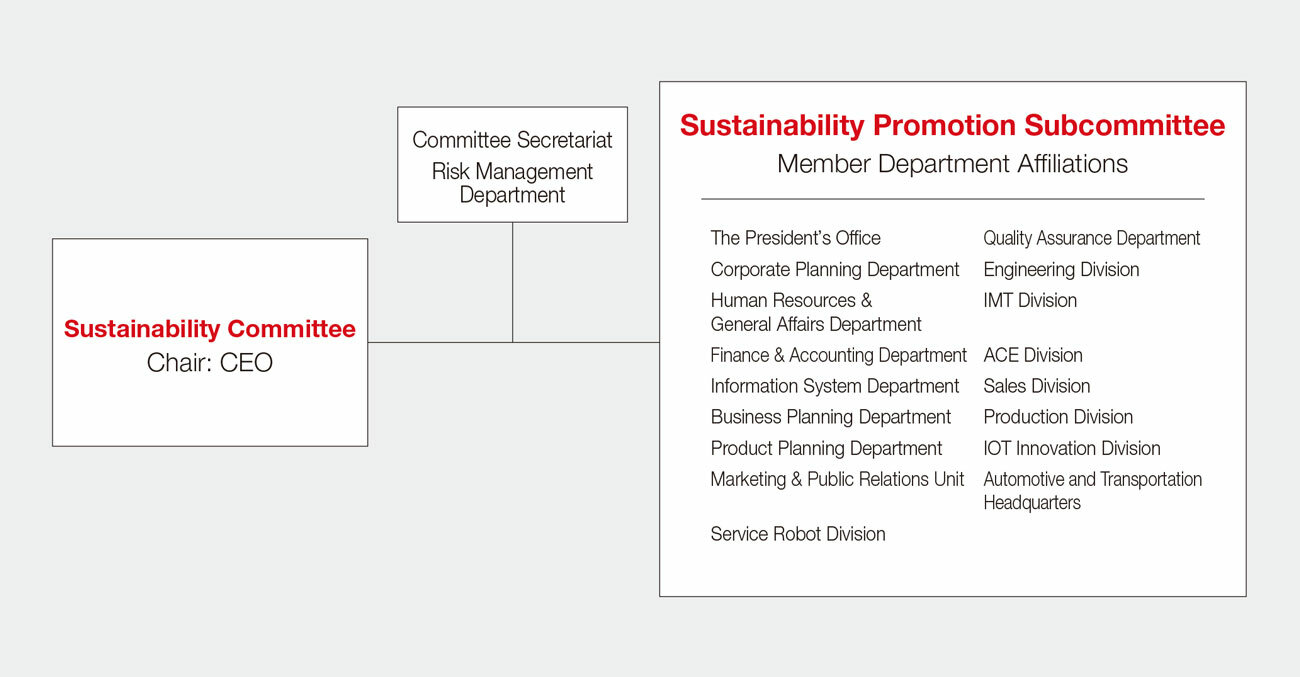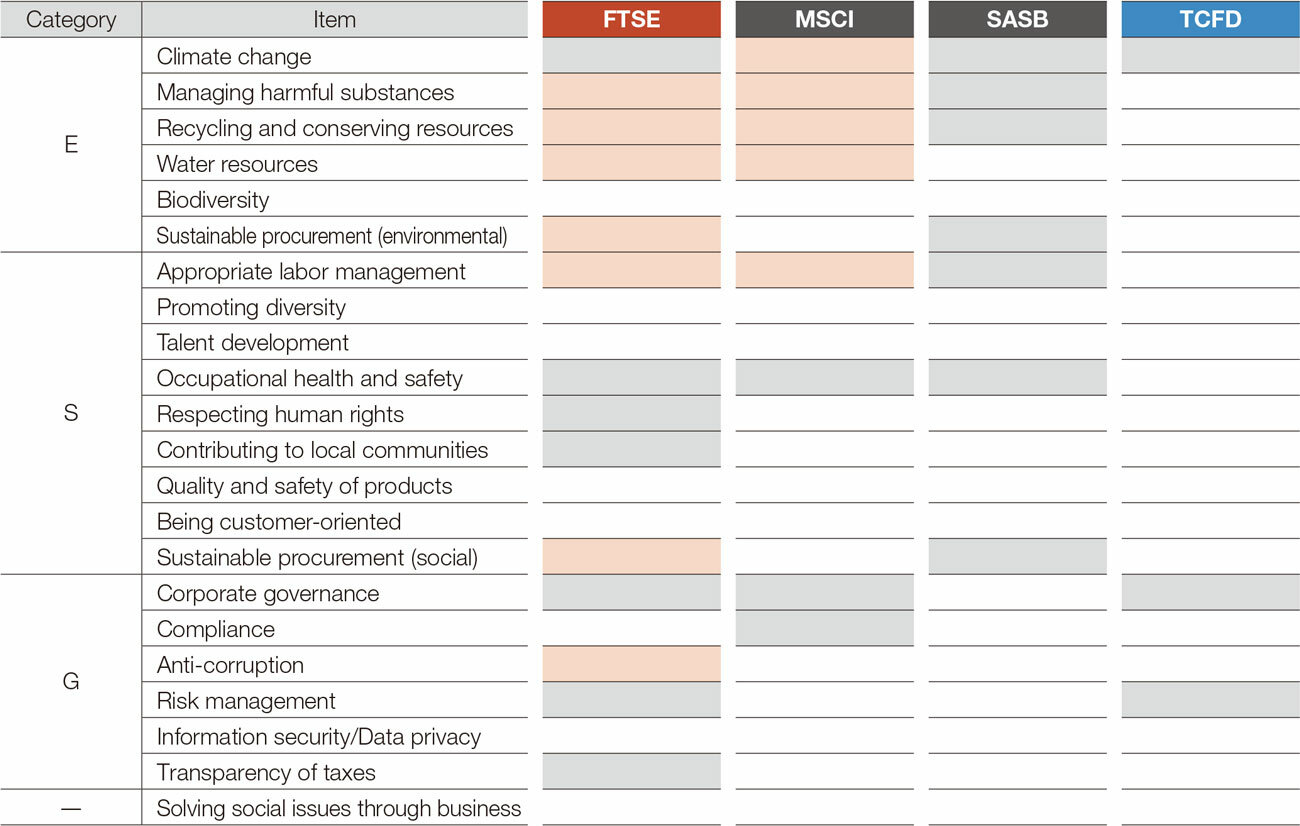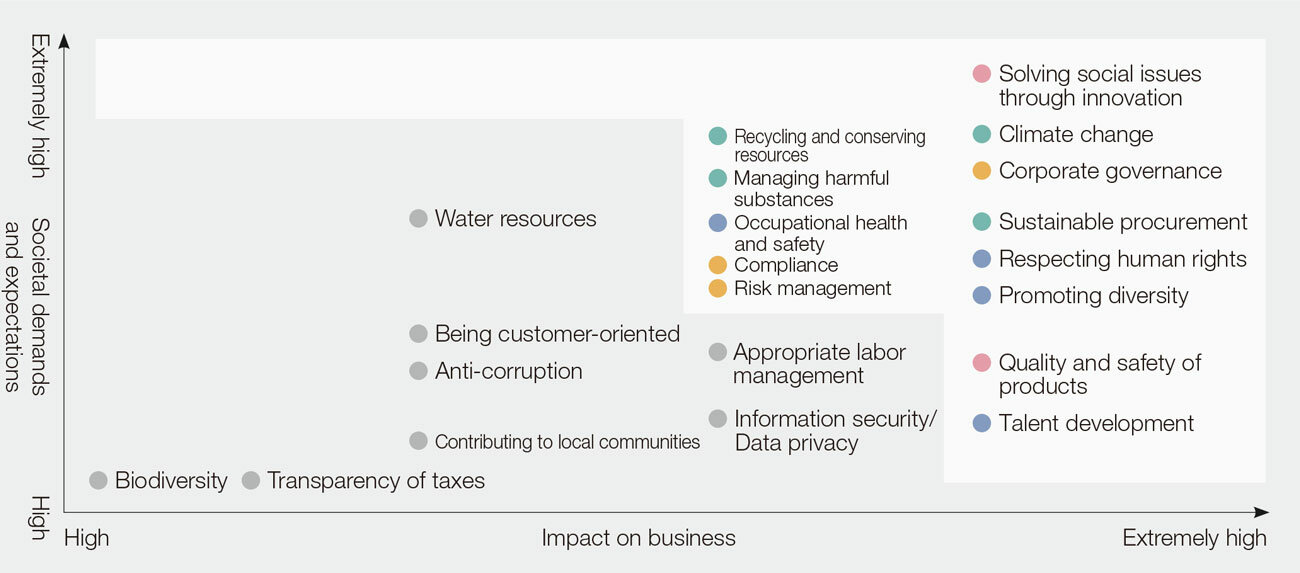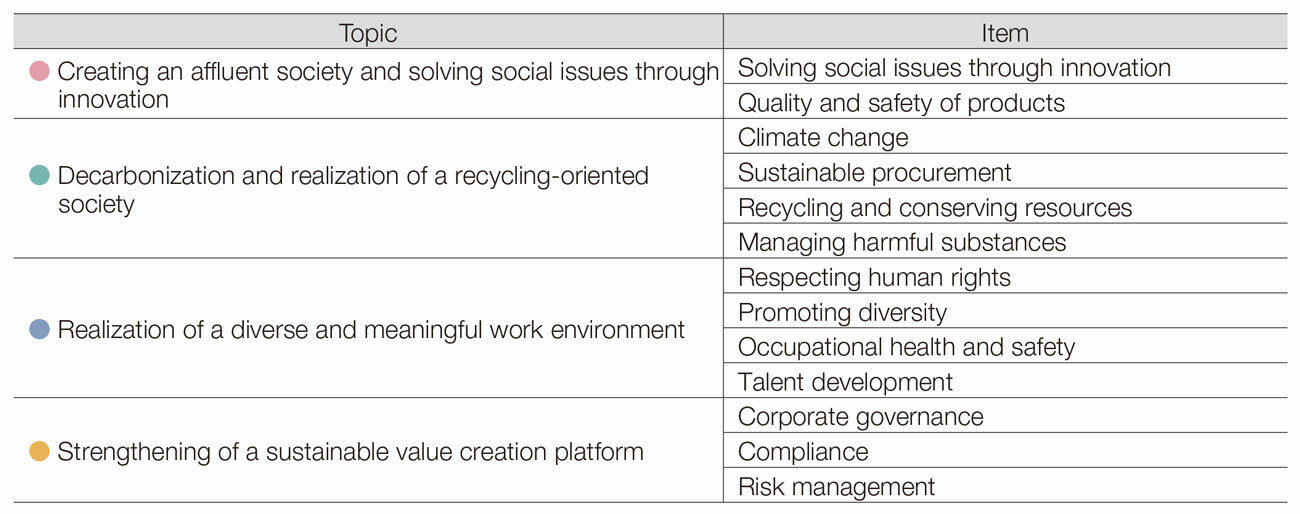Sustainability Promotion Structure
Projects that involve the ESG challenges surrounding companies have recently attracted much attention. Additionally, with the revision of the corporate governance codes that accompanied the restructuring of the Tokyo Stock Exchange's market segments, sustainability disclosures have become essential. This is true for companies listed on the Prime Market in particular. Our company established the Sustainability Committee in October 2022 to act as advisors to the Board of Directors with the aim of establishing, instilling, and maintaining a sustainability promotion structure in order to improve our corporate values and create a sustainable, affluent society.
The Committee's Role
The Sustainability Committee is responsible for formulating policies, regulations, and manuals regarding sustainability, defining important challenges (material issues), goal setting and progress management, and matters related to information disclosure. The Committee also holds meetings at least once a year to report and provide proposals to the Board of Directors as necessary.
Committee Structure
The Sustainability Committee is chaired by the CEO, with the rest of the committee membership being composed of eleven directors, including outside directors. The Risk Management Department serves as the secretariat for the Committee. Its subordinate body, the Sustainability Promotion Subcommittee, has an interdepartmental structure meant to spread awareness of issues to each department, and it is composed of 18 members from across 17 departments.
The Subcommittee, which is managed by the vice president, began its activities reviewing the previously established material issues in November 2021. By June 2022, it had held its sixth meeting and, through a lively exchange of ideas, redefined and reviewed the material issues.
Additionally, the Subcommittee performed an analysis and disclosed information in accordance with TCFD (Task Force on Climate-Related Financial Disclosures) recommendations for the material issue of climate change.


We view THK's business as an endeavor in CSV* that solves society's problems, and we believe that the development of our business will promote sustainability management. By developing rolling linear motion components for machines using unique technology, we have made it possible to conserve energy by reducing frictional resistance to a minimum. To put it another way, since our founding, we have believed that having THK products used in a variety of fields and improving their function will aid in solving environmental issues.
As the president has already stated, we are pushing forward with sustainability projects as a company by transforming into a manufacturing and innovative services company that does not simply make things, but handles each process from before service to after service, with the aim of realizing a sustainable, affluent society.
*CSV is an abbreviation of "creating shared value." This is a strategy of using a company's strengths to solve social challenges and lead to sustained corporate growth.
Material Issues
One of the aforementioned sustainability promotion projects is the creation of the interdepartmental Sustainability Promotion Task Force (currently the Sustainability Promotion Subcommittee) in November 2021. The four material themes below are the result of the proactive exchange of ideas undertaken by its 18 members.
-
Creating an affluent society and solving social issues through innovation
Society and the environment are the foundation of economic activity. Growing our business by aspiring to solve their problems through innovation is THK's most important mission connected to realizing our management philosophy. -
Decarbonization and realization of a recyclingoriented society
We are also investigating the realities of product life cycles beyond THK in terms of how customers use and dispose of our products, and we are pursuing a direction that aims at a recycling-oriented economy that is kinder to the environment. -
Realization of a diverse and meaningful work environment
By accepting the many lifestyles and ways of thinking present in modern society, we are striving toward a world that doesn't leave anyone behind. It is part of the thinking behind the UN Global Compact that the realization of a sustainable society is possible through appropriate actions taken by companies exhibiting creative, responsible leadership for the sake of being good global citizens. For that reason, in an increasingly diverse society, companies have a responsibility to create a meaningful work environment for their employees. -
Strengthening of a sustainable value creation platform
Naturally, realizing the above themes requires a foundation built on robust governance, compliance, and risk management structures.
The Subcommittee's Role
The Sustainability Promotion Subcommittee defines the KPIs and KGIs for the four themes above and offers support both behind the scenes and in plain sight for concrete implementation of these themes as appropriate for each department. It also works to ensure that THK's sustainability activities spread internally and can operate on a deeper level. Accordingly, we must pay more attention to society than anyone else and act from a place of constantly considering what is expected of THK and how it is connected to our business. We have only begun to take such action, but I believe that we can push forward by remembering and taking pride in the fact that our company has contributed to society since its inception.
Material Issues
In November 2021, an interdepartmental project to review material issues in light of the latest changes to the state of society and THK's internal environment was started with the Sustainability Promotion Subcommittee at its center. More concretely, the members of the Subcommittee had numerous exchanges of ideas that came out of discussions with their departments concerning various social issues surrounding the company. They evaluated and discussed things in terms of a horizontal "impact on business" axis and a vertical "societal demands and expectations" axis, created a matrix, and finally narrowed things down to the four themes and the accompanying 13 items. The redefined material issues were later approved by the Board of Directors in June 2022.
Process for Approving Material Issues
Phase 1
Create a material issue candidate list (November to December 2021)
While giving due consideration to THK's existing policies, the Subcommittee made a material issue candidate list (initially with 22 items) based on metrics from ESG evaluation bodies (FTSE and MSCI), investors (SASB1 and TCFD), and other social metrics (SDGs and GRI2), consolidating duplicate and similar items from each of these.
Material Issue List
Grey highlight: Evaluation items for each metric
Light orange highlight: Items considered relatively important for evaluation in THK's industry

1 SASB: Acronym for the Sustainability Accounting Standards Board, the American sustainability accounting standards council.
2 GRI: Acronym for the Global Reporting Initiative, the goal of which is to formulate a framework for international sustainability standards and information reporting.
Phase 2
Evaluate against societal and business standards (January to February 2022)
A matrix was created after a five-stage evaluation that plotted a "societal demands and expectations" axis provided by outside experts against an "impact on business" axis provided by THK.

Phase 3
Create a proposal for redefined material issues (March to May 2022)
The Subcommittee members held a discussion based on the Phase 2 evaluation results. After thoroughly examining the opportunities and risks these results held for long-term value creation, they then drafted a redefined material issue proposal.
Phase 4
Approval by the Board of Directors (June 2022)
The Board of Directors approved the redefined material issue proposal generated in Phase 3.
